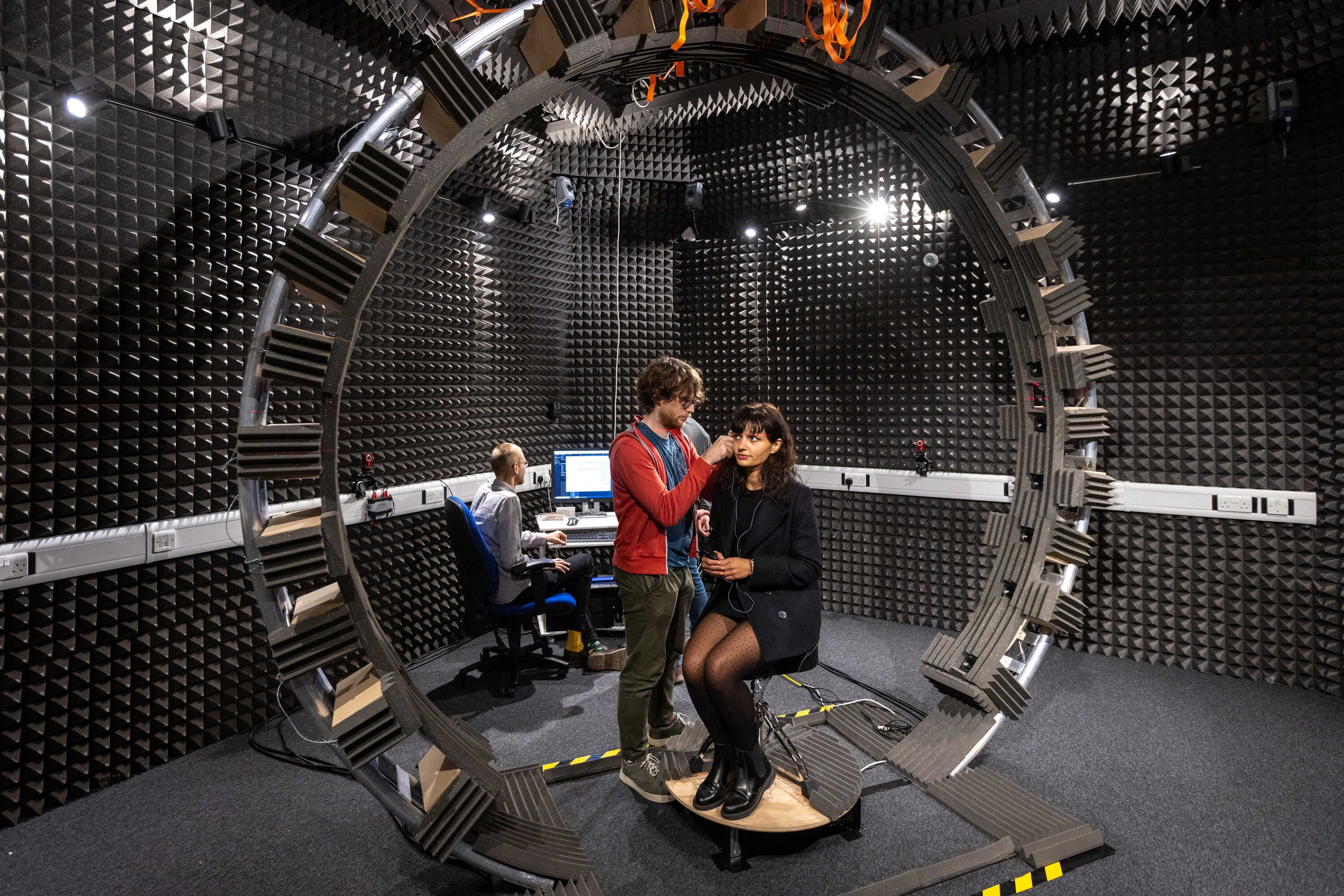.jpg)
Design Engineering Research
Develop transdisciplinary research skills in Design Engineering and apply these to societal problems.
Apply core research skills needed to solve societal challenges
Take a transdisciplinary research approach to evaluating design engineering research problems
Create new insights, build your research profile and communicate your work with relevant stakeholders
Course key facts
Qualification
MRes
Duration
1 year
Start date
September 2025
Study mode
Full-time
-
Fees
£18,500 Home
£42,900 Overseas
Delivered by
Location
-
South Kensington
-
Minimum entry standard
First-Class Honours in a Science, Technology and Engineering discipline
Course overview
Gain state-of-the-art knowledge on transdisciplinary research methods, design engineering practice and modelling/simulation tools.
Deepen your subject-area expertise with 2 electives selected from a list of exciting modules.
You will apply these skills towards addressing a design engineering research problem through the execution of your research project.
Communicate your research outputs to academic and industry stakeholders towards building your future research career.
Structure
This page is updated regularly to reflect the latest version of the curriculum. However, this information is subject to change.
Find out more about potential course changes.
Please note: it may not always be possible to take specific combinations of modules due to timetabling conflicts. For confirmation, please check with the relevant department.
You will take five core modules to form the foundations of your MRes, equipping you with an understanding of Design engineering practices, skills needed to model and simulate complex systems, and transdisciplinary research skills.
The course culminates in a Master’s research project which will focus on solving a design engineering problem.
Core Modules
Uncover design engineering approaches, methods, and tools to develop innovative solutions for complex challenges. Master user and business needs evaluation, problem discovery, and generation of solution concepts for portfolios, competitions, and potential commercialization.
Learn and apply a wide range of research methods involving human subjects. Gain foundational knowledge of various data collection and analysis techniques and use them to tackle complex problems.
Discover and apply state-of-the-art transdisciplinary mixed methods to address complex problems in fields such as health and sustainability. Learn advanced quantitative techniques, Natural Language Processing, and AI chatbot development to analyse stakeholder behaviours and human-human and human-AI interactions.
Learn how numeric simulations can be applied to problems in Design Engineering (and some problems selected from physical, biological, and social sciences).
This module ranges from numeric underpinning to chaos and game theory with a range of applications that will give an early career researcher a window into the variety of tools available to them.
Teaching and assessment
Balance of teaching and learning
Key
- Taught modules
- Independent Study
- Research project
Balance of assessment
- 11% Lectures, tutorials and practicals
- 24% Independent Study
- 65% Individual research
Teaching and learning methods
-
Lectures
-
Tutorials
-
Presentations
-
Project-based learning
-
Virtual learning environment
-
Team-based activities
-
Lab work
-
Independent Study
-
Flipped learning
-
Skill workshops
Balance of assessment
Key
- Practical
- Coursework
- Exams
- 14% Practicals
- 77% Course Work
- 9% Exams
Assessment methods
-
Coursework
-
Project work
-
Research dissertation
-
Individual and group reports
-
Exams
-
Viva voce
Entry requirements
We consider all applicants on an individual basis, welcoming students from all over the world.
First-Class Honours in a Science, Technology and Engineering discipline (or a comparable qualification recognised by Imperial).
Footnotes
A 2:1 equivalent with more than 2 years professional experience or further studies in a related area may be considered.
In addition to demonstrating you have met our entry requirements, we ask you to supply the following:
- Two academic references
- A written statement articulating motivation and evidencing suitability for the degree.
How to apply
Apply online
You can submit one application form per year of entry. You can choose up to two courses.
Application deadlines – Round 3 closes on Thursday 15 May 2025
We operate a staged admissions process with several application rounds throughout the year.
Apply by 23.59 (UK time) on the closing date of an application round, to ensure you receive a response on your application by the relevant decision date.
Application rounds dates
Round 1
- Applications open on Friday 27 September 2024
- Applications close on Thursday 16 January 2025
- Decision by Thursday 6 March 2025
Round 2
- Applications open on Friday 17 January 2025
- Applications close on Thursday 27 March 2025
- Decision by Thursday 1 May 2025
Round 3
- Applications open on Friday 28 March 2025
- Applications close on Thursday 15 May 2025
- Decision by Thursday 17 July 2025
Round 4
- Applications open on Friday 16 May 2025
- Applications close on Friday 4 July 2025
- Decision by Thursday 31 July 2025
Round 5
- Applications open on Saturday 5 July 2025
- Applications close on Monday 1 September 2025
- Decision by: Monday 8 September 2025
There is no application fee for MRes courses, Postgraduate Certificates, Postgraduate Diplomas, or courses such as PhDs and EngDs.
If you are applying for a taught Master’s course, you will need to pay an application fee before submitting your application.
The fee applies per application and not per course.
- £80 for all taught Master's applications, excluding those to the Imperial College Business School.
- £100 for all MSc applications to the Imperial College Business School.
- £150 for all MBA applications to the Imperial College Business School.
If you are facing financial hardship and are unable to pay the application fee, we encourage you to apply for our application fee waiver.
If you are interested in joining us, you can apply online directly through the Imperial College website.
Find out more about how to apply for a Master's course, including references and personal statements.
In addition to demonstrating you have met our entry requirements, we ask you to supply the following:
- Two references evidencing your analytical skills (e.g. academic references citing modules studied, and/or professional references citing applied examples in previous work experience).
- A personal written statement articulating your motivation and suitability for the degree.
Candidates who are shortlisted after this initial application will be invited to attend an interview with an Academic member of staff. This will normally be conducted remotely online.
Unless you are from an exempt nationality, you will need an ATAS certificate to obtain your visa and study this course.
Nationals from the following countries are exempt: Switzerland, Australia, Canada, Japan, New Zealand, Singapore, South Korea, USA and EEA members.
Use this information when applying for an ATAS certificate to study this course:
- CAH code: CAH10-01-01
- Descriptor: Engineering (other)
- Supervisor name: Dr Billy Wu
Get guidance and support for obtaining an ATAS certificate.
Fees and funding
Home fee
2025 entry
£18,500
You should expect and budget for your fees to increase each year.
Your fee is based on the year you enter the College, not your year of study. This means that if you repeat a year or resume your studies after an interruption, your fees will only increase by the amount linked to inflation.
Find out more about our , including how inflationary increases are applied to your tuition fees in subsequent years of study.
Whether you pay the Home or Overseas fee depends on your fee status. This is assessed based on UK Government legislation and includes things like where you live and your nationality or residency status. Find out .
If you're a UK national, or EU national with settled or pre-settled status under the EU Settlement Scheme, you may be able to apply for a from the UK government, if you meet certain criteria.
The government has not yet published the loan amount for students starting courses in Autumn 2024. As a guide, the maximum value of the loan was £12,167 for courses starting on or after 1 August 2023.
The loan is not means-tested and you can choose whether to put it towards your tuition fees or living costs.
Scholarships
The Royal Commission for the Exhibition of 1851 Industrial Design Studentships
Value per award
- Full tuition fees plus stipend.
Who it's for
- UK resident, recently graduated first degree, and intending to make a career in British Industry.
Presidential scholarships for students of Black heritage
Value per award
- Home tuition fees up to £18,500, an annual maintenance grant of £21,000, and an allowance of £1,500 for equipment.
Who it's for
- Applicants of Black heritage
Master's Scholarship supporting disabled students
Value per award
- Tuition fees up to £18,500, maintenance grant of £21,000, and allowance of £1,500 for equipment.
Who it's for
- Disabled applicants
Sanctuary Scholarship – Postgraduate
Value per award
- Full tuition fees, £21,000 living costs, and £1,500 equipment grant
Who it's for
- Refugee applicants
Your future career
Develop core skills needed to pursue a career in design engineering research.
Synthesize your subject specific experiences with transdisciplinary mixed research methods to solve societal problems.
Build a track record on design engineering research and showcase your work to relevant stakeholders.
Graduating students from the MRes will be well placed for onwards study for a PhD or industrial research roles.
Explore design engineering challenges covering performance, systemic, contextual and global challenges.
Further links
Contact the department
- T: +44(0) 20 7594 8888
- E: designeng-mres@imperial.ac.uk
Course directors: Dr Billy Wu and Dr Freddie Page
Visit the Dyson School of Design Engineering website.

Request info
Find out more about studying at Imperial. Receive updates about life in our community, including event invites and download our latest Study guide.

Events, tasters and talks
Meet us and find out more about studying at Imperial.

Terms and conditions
There are some important pieces of information you should be aware of when applying to Imperial. These include key information about your tuition fees, funding, visas, accommodation and more.
You can find further information about your course, including degree classifications, regulations, progression and awards in the programme specification for your course.
Programme specifications


